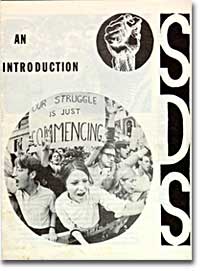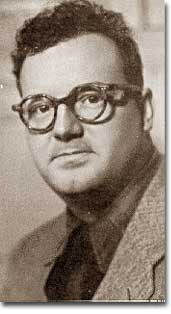57g. Student Activism

The Students for a Democratic Society — or SDS — became the leaders of the American anti-war movement following the release of the Port Huron Statement. The above pamphlet served as an introduction to the SDS struggle against U.S. involvement in Vietnam.
In June 1962, the founding members of Students for a Democratic Society (SDS) ratified the Port Huron Statement. The Huron Statement was a manifesto, largely written by a young student named Tom Hayden, condemning middle-class materialism, racism, conformity, and anticommunism.
Strongly influenced by C. Wright Mills' The Power Elite, SDS members feared that the Cold War was undermining American democracy. A military-industrial complex seemed to be driving the United States. Military leaders justified huge budgets by involvement in foreign wars. The expenditures led to major defense contracts for industrialists and millions of jobs across America. The liberal establishment of Kennedy and Johnson accepted the trend for fear of losing powerful supporters and thousands of votes from working Americans. The results, they claimed led to unjust involvement in foreign conflicts. Hayden called for "participatory democracy," — grassroots organizations where the true voices of Americans could be heard.

C. Wright Mills' 1956 book The Power Elite contended that a small group of Americans — including members of government, titans of industry and military leaders — were responsible for the fate of the Nation. His theories provided inspiration for the student activists of the 1960s who sought to return this power to ordinary citizens.
SDS became the leaders of the antiwar movement in America. Drawing support from the civil rights movement, SDS chapters organized local demonstrations on college campuses and marches to the steps of the Capitol Building. They worked in inner cities to provide free lunches and participated in voter drives to turn out the African American electorate in the Deep South. In addition to these causes, the movement was concerned with student rights. Many universities required a dress code, curfews, and restrictions on free speech. As SDS advocated a freer society, they pointed their arguments to their deans as well as their political representatives.
With the growth of SDS, the New Left flourished in America. Student leaders labeled the Old Left the Socialists of a bygone era. The Old Left was concerned with the problems brought by poverty, while the New Left criticized the suburban conformity and career materialism spawned by postwar affluence as well. They were critical of their left-leaning national politicians. SDS leaders did not believe Kennedy and Johnson were sincere in their support of civil rights. In the wake of McCarthyism, taking a soft stand on communism was unthinkable to Washington politicians. While the New Left did not glorify the Soviet system, they were willing to blame both the United States and the Soviet Union for escalating the Cold War.
As the decade came to a close, SDS fragmented into moderate and radical factions much like most other movements. Although most SDS members were dedicated to peaceful protest, some did go beyond marches to the occupation of buildings and confrontations with the police. An extreme branch of SDS splintered off to form the Weathermen in 1970. This group was a terrorist organization openly committed to a violent overthrow of the government. FBI scrutiny forced many Weathermen underground before long.






